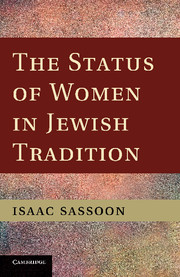Book contents
- Frontmatter
- Contents
- Preface
- Acknowledgements
- Glossary
- Abbreviations
- PART I MONOGAMY
- PART II COMMANDMENTS (MIṢVOT)
- 8 Zeman Gerama
- 9 Derekh
- 10 The Scriptural Evidence
- 11 Deuteronomy: A Pattern
- 12 The Priestly Torah
- 13 Two Writers on Purity Law
- 14 Torah Study
- PART III INTRINSIC EQUALITY
- Conclusion
- Bibliography
- Index of Authors (Medieval & Pre-modern)
- Index of Citations from Rabbinic Literature
- Index of Names (Hebrew Bible)
- Index of Names (Talmudic)
- General Index
10 - The Scriptural Evidence
Published online by Cambridge University Press: 01 June 2011
- Frontmatter
- Contents
- Preface
- Acknowledgements
- Glossary
- Abbreviations
- PART I MONOGAMY
- PART II COMMANDMENTS (MIṢVOT)
- 8 Zeman Gerama
- 9 Derekh
- 10 The Scriptural Evidence
- 11 Deuteronomy: A Pattern
- 12 The Priestly Torah
- 13 Two Writers on Purity Law
- 14 Torah Study
- PART III INTRINSIC EQUALITY
- Conclusion
- Bibliography
- Index of Authors (Medieval & Pre-modern)
- Index of Citations from Rabbinic Literature
- Index of Names (Hebrew Bible)
- Index of Names (Talmudic)
- General Index
Summary
In Judaism, to receive commandments from God is the highest favour – or to paraphrase Proverbs 3:12, Whom God loves he exhorts as a father does who cares for his children. Mostly for this reason, Israel came to reckon itself chosen, having been vouchsafed many miṣvot. But who were the recipients of the commandments – all Israel or merely the menfolk?
We have not forgotten that according to Genesis1, the first humans are spoken to conjointly by God who blesses them (v. 28) and instructs them (v. 29), thereby affirming their capacity to understand divine instructions and carry them out. How easy, if not superfluous, would our task be were all voices within Scripture as inclusive in their miṣvah bestowal as Genesis 1! But the Torah – as we do not tire of repeating – is multivocal, and our task is to unmuffle any willing voice. Of rabbinic polyphony we have already sampled the buzz in R. Hananiah ben Aqashia and his counterpoint, as well as the ding-dong of the Qiddushin sugya. There the Mishnah decreed: “all positive miṣvot bound by time apply to men not to women. Miṣvot not bound by time apply to men and women” (Qid. 1:7). However, as we saw, other tannaic sources – some more generous, some more frugal – could ill adjust to the Mishnah.
- Type
- Chapter
- Information
- The Status of Women in Jewish Tradition , pp. 67 - 69Publisher: Cambridge University PressPrint publication year: 2011



